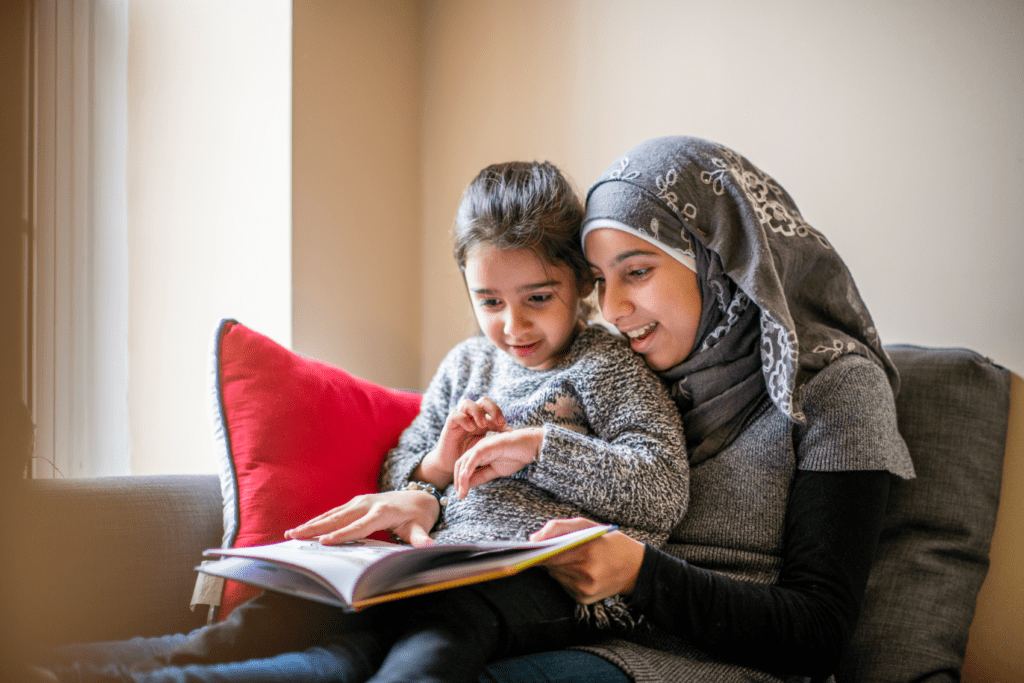The Family Way to Reading & School Readiness


Reading and school readiness: these are two topics that get early childhood professionals chattering. Reading on its own is fodder for robust conversations. Folks discuss the importance of everything from pre-reading skills development to “the science of reading” and do so with conviction. If and when you add school readiness to the mix, the conversations often become even more passionate. Should a child be reading before they enter kindergarten? What does it mean to be “ready” for school? What happens if a child is found “not ready” for school? These questions and more can result in hours-long discussions that end with more questions rather than answers. A positive effect of these ongoing discussions about reading and school readiness in early childhood is the wealth of information on the topics.
Reading
Current research on reading tells us that we should pay attention to children’s language skills well before they enter school. In fact, one source says, “Language…may be the strongest
predictor of future success.”1 This makes sense when you think about it, because language really is the foundation of learning in all other academic areas. It is also linked to executive functioning in young children, as it is a tool for children to use to regulate their emotions and engage with their peers and adults.
School Readiness
In my work as the director of a Head Start Collaboration Office, I used the Head Start Parent, Family, and Community Engagement (PFCE) Framework as a resource on the topic of school readiness. Head Start defines school readiness as “children possessing the skills, knowledge, and attitudes necessary for success in school and for later learning and life.” The Head Start approach to school readiness, then, means that children are ready for school, families are ready to support their children’s learning, and schools are ready for children.
Families
Given what we know about reading and school readiness, every early childhood educator should ask themselves, “How can I help children get ready for school while also getting families ready to support their children’s learning? As an educator, how can I ensure my school is ready for children?” The answer to both questions is an important one: through partnerships with the children’s families.
Partnerships with families are critical to getting children ready for reading and for school because families are the first teachers of children. As a good partner, you can help them determine the best things to teach their children, especially about language and the foundational skills needed for their children to be ready to read. Here are three specific suggestions you can make to families.
- Children need you to talk to them. Talk about anything and everything. The more topics you talk about to children, the more likely they are to pick up the background knowledge they need for becoming good readers. Background knowledge is the information a child knows about a word or a concept. The more a child knows about a topic, the easier it is to read a text with comprehension. The best way to build background knowledge is to expose children to vocabulary and concepts deeply and broadly.
- Children need you to talk with them. Back-and-forth exchanges with children help them learn the pragmatics of spoken language. This can be especially helpful if a child is an English-as-a-second-language communicator. When children are spoken to at home in their first language, they can pick up on those spoken language conventions and develop an even stronger command of their vocabulary.
- Children need to see there is joy in learning to use language and reading. Singing songs and nursery rhymes is a great way to bring joy to young children, as is telling stories and reading books aloud. The stories you tell can be specific to your family and teach your children about your cultural practices, traditions, or customs. This approach helps children stay engaged and find relevancy and meaning in what they’re learning.

Webinars for Head Start professionals
Our free webinars connect Head Start professionals to engaging learning experiences and information they can utilize in the classroom. Explore our selection of free on-demand webinars for Head Start professionals.
1. Leger, M., Roberts, C., & Sharp, S. (2020). The road to readiness: the precursors and practices that predict school readiness and later school success. New York, NY: Overdeck Family Foundation.